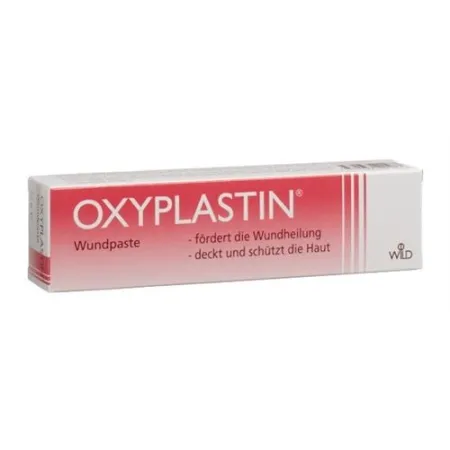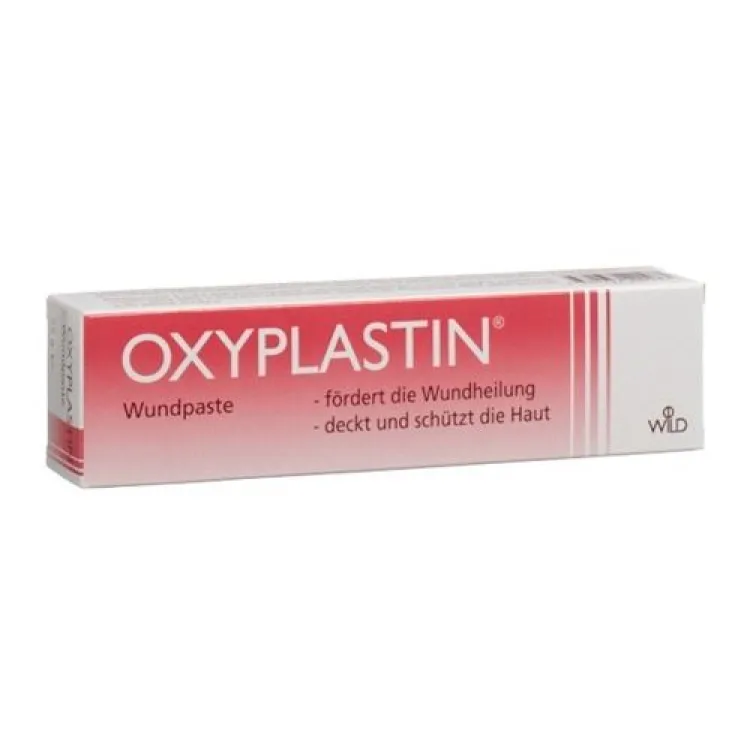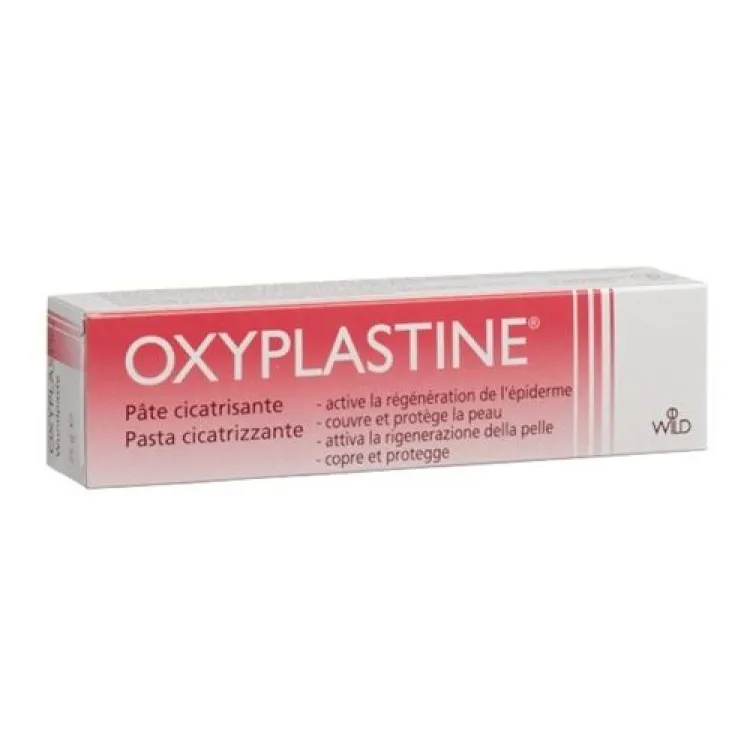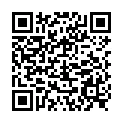DISCLAIMER: "These statements have not been evaluated by the FDA or Swissmedic. This product is not intended to diagnose, treat, cure, or prevent any disease."
Oxyplastin Wound Paste tube 75 g
Oxyplastin Wundpaste Tb 75 g
-
35.27 USD

- Availability: In stock
- Distributor: DR. WILD & CO. AG
- Product Code: 1697262
- ATC-code D02AB
- EAN 7680137490283
Ingredient:
Description
Oxyplastin promotes wound healing and protects the skin. Oxyplastin is an oily, homogeneous paste that is easy to spread on the skin. It has good adhesion properties that support the wound-healing and skin-protecting properties. Oxyplastin promotes tissue regeneration and accelerates scarring.
Oxyplastin is used to protect the skin against wetness from diapers and to treat redness and soreness on the buttocks (nappy rash). Oxyplastin is also used to treat minor injuries and skin damage.
According to the Ref: of the doctor, oxyplastin can also be used to protect the skin in the case of an artificial bowel outlet (anus praeter), artificial bladder fistula (cystostomy), artificial renal fistula (nephrostomy) or after opening the front wall of the trachea (tracheostomy) and under plaster casts.
Ref:-approved patient information
Oxyplastin®
What is oxyplastin and when is it used?
Oxyplastin promotes the wound healing and protects the skin. Oxyplastin is an oily, homogeneous paste that is easy to spread on the skin. It has good adhesion properties that support the wound-healing and skin-protecting properties. Oxyplastin promotes tissue regeneration and accelerates scarring.
Oxyplastin is used to protect the skin against wetness from diapers and to treat redness and soreness on the buttocks (nappy rash). Oxyplastin is also used to treat minor injuries and skin damage.
According to the Ref: of the doctor, oxyplastin can also be used to protect the skin in the case of an artificial bowel outlet (anus praeter), artificial bladder fistula (cystostomy), artificial renal fistula (nephrostomy) or after opening the front wall of the trachea (tracheostomy) and under plaster casts.
When should Oxyplastin not be used?
If you are hypersensitive to one of the ingredients (see «What does Oxyplastin contain?»), Oxyplastin must not be used.
When should you be careful when using oxyplastin?
Oxyplastin contains wool wax, which can cause localized skin irritation (e.g. contact dermatitis). This Care product contains the fragrances geranium, origanum, thyme and verbena, the components of which (benzyl alcohol, benzyl benzoate, benzyl salicylate, cinnamyl alcohol, citral, citronellol, eugenol, farnesol, geraniol, d-limonene and linalool) may cause allergic reactions (see «What is contained in oxyplastin?»).
Tell your doctor, Ref: or druggist if you
- suffer from other illnesses,
- have allergies or
- take other medicines (including those you bought yourself!) or use them externally!
May Oxyplastin be used during pregnancy or while breastfeeding?
Pregnancy
Based on previous experience, is at more appropriate Application no known risk for the child. However, systematic scientific investigations have never been carried out.
Breastfeeding
Oxyplastin must not be applied to the nipple area while breastfeeding to avoid ingestion by the infant.
As a precaution, you should avoid taking medicines during pregnancy and breastfeeding or ask your doctor, Ref: or druggist for advice.
How do you use Oxyplastin?
For prevention: Daily application of a thin layer of Oxyplastin protects the child's skin against the wetness of the diapers and prevents Redness, which later leads to soreness.
To treat skin redness and soreness on the buttocks: apply oxyplastin to the areas to be treated once or several times a day.
For the Care of minor injuries and skin damage: If necessary, apply Oxyplastin once or several times a day to the areas to be treated.
If there is no improvement after 2-3 weeks or if the condition worsens, a doctor should be consulted.
Follow the dosage given in the package leaflet or as prescribed by your doctor. If you think the medicine is too weak or too strong, talk to your doctor, Ref: or druggist.
What side effects can Oxyplastin have?
The following side effects can occur when using Oxyplastin: Hypersensitivity reactions.
If you get any side effects, talk to your doctor, Ref: or druggist. This also applies in particular to side effects that are not listed in this leaflet.
What else needs to be considered?
The Care product may only be used up to the date marked «EXP» on the container.
Storage Instructions
Store at room temperature (15-25 °C).
Keep out of the reach of children.
Further information
Your doctor, Ref: or druggist can provide you with further information.
What does Oxyplastin contain?
Active ingredients
The active ingredient in Oxyplastin is zinc oxide. 1 g paste contains 460 mg zinc oxide.
Excipients
1 g paste contains 40 mg wool wax, the fragrances geranium, origanum, thyme and verbena (containing benzyl alcohol, benzyl benzoate, benzyl salicylate, cinnamyl alcohol, citral, citronellol, eugenol , Farnesol, Geraniol, D-Limonene and Linalool) as well as Virgin Castor Oil, Purified Water, White Beeswax, Cholesterol and Calcium Hydroxide.
Approval number
13749 (Ref:)
Where can you get Oxyplastin? What packs are available?
In pharmacies and drugstores, without a doctor's Ref:.
Tubes of 75 g and 120 g.
Authorization holder
VERFORA SA, 1752 Villars-sur-Glâne
This leaflet was last checked by the Medicines Agency (Ref:) in July 2020.





